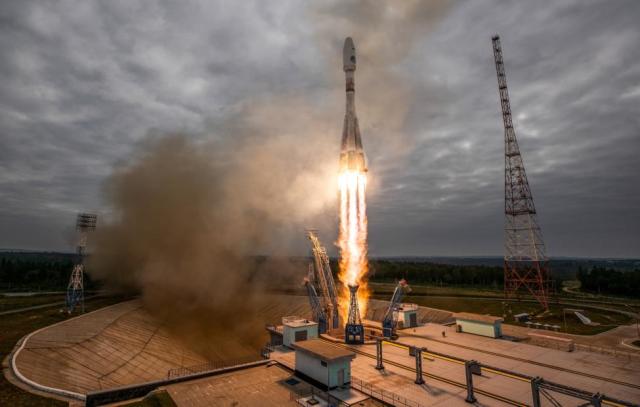At the same time, the newspaper believes that the United States and its allies are still leading in the lunar race
BRUSSELS, August 11. /tass/. The successful launch of the Russian Luna-25 automatic station to the Moon has heated up the space race to reach the valuable resources of the Earth's natural satellite, which is being waged by Russia and China against the United States and NATO. This opinion was expressed by the European edition of the newspaper Politico, commenting on the launch.
"Russia launched to the moon, which further heated up the space race against the United States. Washington and Moscow are fighting to reach the South Pole of the Moon and its natural resources. Despite the sanctions, [Russian President] Vladimir Putin seeks to return Russia to the space race," Politico notes.
"If they can pull off this mission, it will be a huge technological and scientific achievement," the newspaper quotes Tim Marshall, author of the book "The Future of Geography", dedicated to the development of space geopolitics in the coming decades. He stressed that the successful landing of Luna-25 near the South Pole of the Moon will be a big step forward in the implementation of joint plans of Russia and China to create a permanent base on the Moon by 2030.
The publication emphasizes that at the South Pole of the Moon, scientists expect to find significant reserves of water in the form of ice, hidden in areas inaccessible to sunlight from the constant shadow of mountains and in the depths of numerous craters. If expeditions to the moon confirm the presence of water reserves there. This will solve the problem of creating on-site oxygen and drinking water for the habitable lunar station, as well as fuel for spacecraft, by electrolysis of water and obtaining hydrogen and oxygen from it. This, in turn, will make it possible to turn the Moon into a transshipment cosmodrome for expeditions deep into the Solar System.
At the same time, Politico believes that the United States and its allies are still leading in the lunar race, because, unlike Russia and China, they intend to send a manned mission to the Moon in the coming years as part of their multinational Artemis program, in which 29 countries, including most NATO states, participate. The agreements signed by the participating countries of the Artemis program include their support for the rules developed by Washington for the use of space resources in exchange for the future granting these states "exclusive access to various commercial zones on the Moon, for example, areas close to ice deposits," Politico notes.
According to the publication, the successes of Russia and China in a competing moon exploration project will mean that it will not be possible to establish an American world order based on rules in space, and each of the space powers will be guided by its own norms of space exploration.
"Luna-25"
The Soyuz-2.1b carrier rocket with the Luna-25 automatic station launched from the Vostochny cosmodrome at 02:10 Moscow Time. On August 16, the spacecraft should enter the lunar orbit, and on August 21, its soft landing is expected.
The main task of Luna-25 will be the development of soft landing technology. The mission may become the first vehicle to land at the South Pole of a natural satellite of the Earth. The station will study the internal structure and exploration of natural resources, including water, as well as investigate the impact of cosmic rays and electromagnetic radiation on the surface of the Moon.
Several cameras are installed on the device. They will shoot the landing timelapse, a panorama of the Earth's natural satellite in HDR and the settling dust to study it. Luna-25 will conduct pre-programmed shooting, as well as photograph the Moon on command from Earth.

